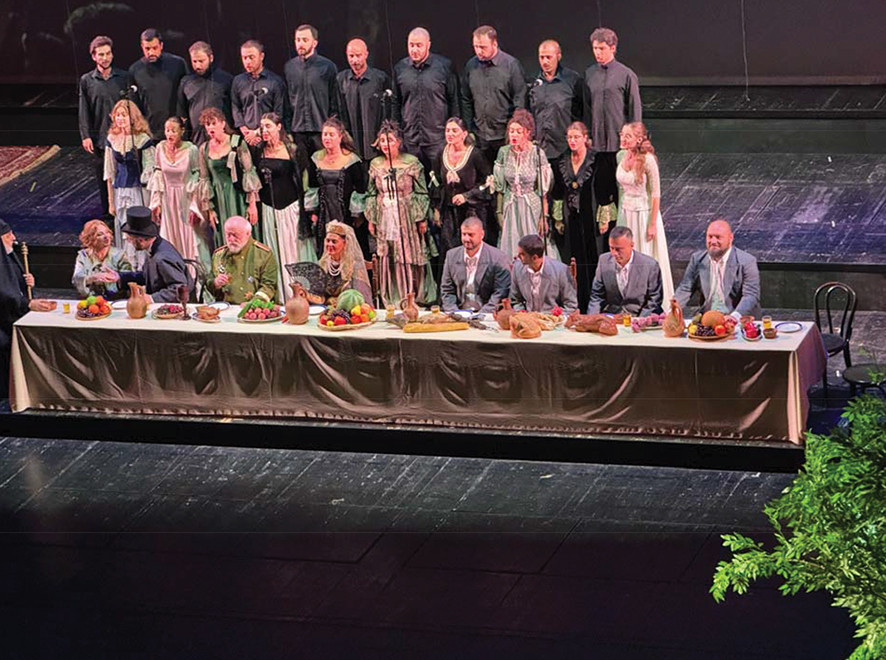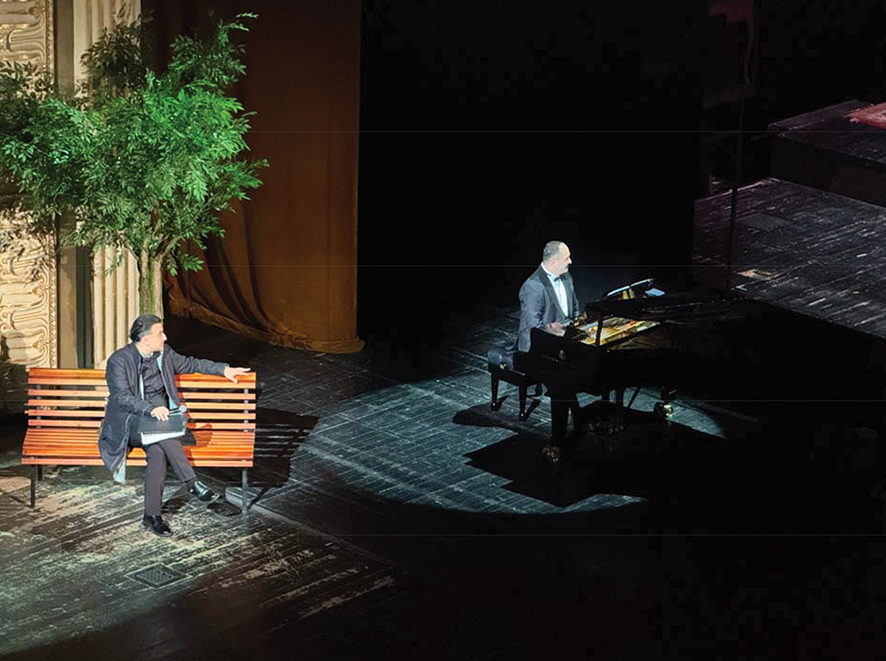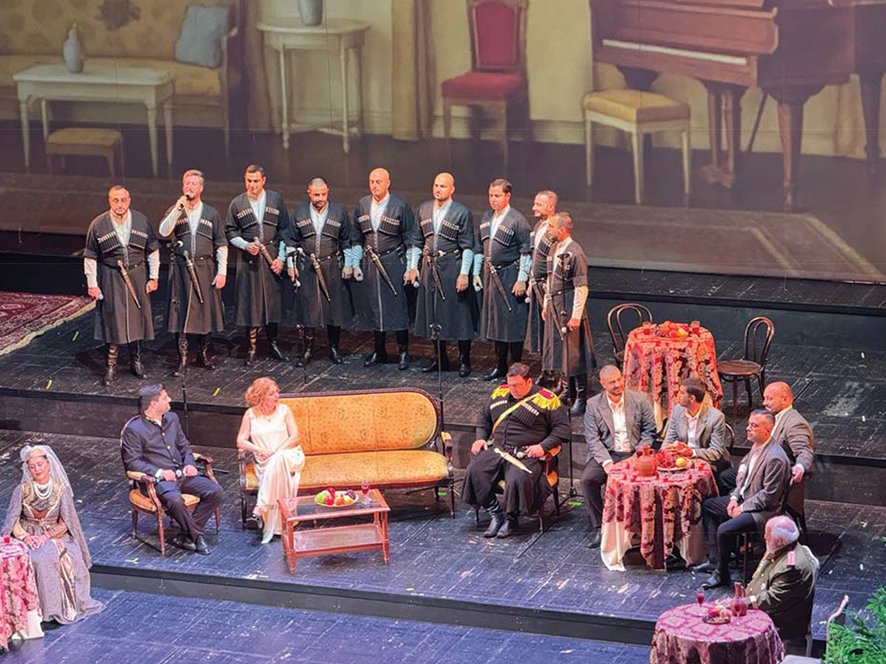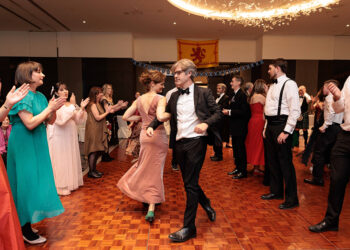On the evening of July 8, a genre-defying musical work took to the stage of the Tbilisi Opera and Ballet Theater — TATO, a two-act “musical poem” by Georgian composer Mariko Kvaliashvili, inspired by the life and legacy of one of the nation’s most enigmatic cultural figures, Nikoloz Baratashvili (1817–1845).
Combining operatic solemnity with folk pathos and pop sensibility, Kvaliashvili’s piece walked the tightrope between reverence and reinvention. It was a spectacle not only of Georgian identity but of an evolving musical nation in search of new mythologies.

Known by his affectionate nickname “Tato,” Nikoloz Baratashvili occupies a near-mythic role in the Georgian imagination — a tragic Romantic genius who died young (at 27) and left behind a slender but incandescent body of poetry. Born into aristocracy but living in imperial exile, his verses became synonymous with spiritual anguish, national longing, and metaphysical beauty. In the 19th-century Georgian context — under the weight of Russian domination — Baratashvili symbolized a thwarted liberation, both personal and political. His best-known poem, “Merani”, is often compared to Byron’s Childe Harold, with whom Baratashvili shares a haunting posthumous fame.
Kvaliashvili’s TATO does not seek to dramatize a single work. Instead, it stages the life of the poet itself as a metaphysical opera, tracing his journey from cradle to grave in twelve stylized scenes, populated by historical and imagined figures who oscillate between sacred ritual and showbiz spectacle.
From the very first notes, TATO makes its boldest statement: this is not opera in any conventional sense. Nor is it popera, or a musical. It is rather a hybrid oratorio, moving between idioms with deliberate intensity. Think of it as an Eastern Orthodox Jesus Christ Superstar refracted through the aesthetics of national folklore, post-Soviet stadium ballads, and the stylistics of Georgian ritual music.

Mariko Kvaliashvili — herself a composer well-versed in sacred, choral, and theatrical music — has composed 21 new vocal numbers for this production. These were delivered by a constellation of performers drawn from radically different traditions. Opera soloists from the Tbilisi Opera (including Marika Machitidze, Sulkhan Gvelesiani, and Tamaz Saginadze) lent dramatic gravitas, with clear phrasing and resonant lyricism. Pop stars, including Eka Kvaliashvili and Giga Abesadze, brought an earthy immediacy to scenes of romantic and patriotic conflict. The Gori Women’s Choir, under the precise direction of Teona Tsiramua, added an otherworldly choral shimmer, especially in liturgical sequences evoking Baratashvili’s existential solitude. Folk ensembles and choirs such as Shvidkatsa, Akhali Bana, Sagalobeli, and Kashueti Cathedral Choir evoked the organic polyphony of Georgian spiritual culture.
What could easily have collapsed into an aesthetic cacophony instead became a kind of a collage. This was achieved largely thanks to director Andro Enukidze, who approached the staging with reverent stylization. Each scene unfurled like an icon painting in motion: dreamlike tableaux combining archaic costumes (designed by Vano Chelidze), ritualistic gestures, and bursts of emotional intensity. Certain scenes were given operatic heft through the use of choral layering and sacred motifs, resembling fragments of vesper services or medieval Sharakans. Elsewhere, love scenes were treated with a lighter tone, stylized in the mode of 20th-century chanson or even Georgian estrada ballads.

One of the most compelling musical strategies was the use of oriental ornamentation and folk microtonality in moments of spiritual hallucination or ecstatic vision — a subtle nod, perhaps, to the poet’s entrapment in a geopolitical corridor between East and West. Choreography, too, was ornamental. The “Abkhazeti” Dance Ensemble presented stylized historical forms, which deepened the sense of mythic time. Particularly striking was the use of oriental dancer Elena Chikhladze, whose solo appearance evoked a Byronic vision of the exoticized Other, filtered through Romantic imagination.
TATO is not simply a play or an opera. It is a collective effort to synthesize the fragments of Georgian identity in pop-cultured sonic form. In this sense, it joins a small but growing number of works — from Zurab Nadareishvili’s opera And It Was Evening… to Nino Janjgava’s liturgical compositions — that seek to break down the barriers between sacred, folk, and theatrical traditions in Georgian music. In a moment when many national theatres seek to “modernize” heritage by borrowing globalized aesthetics, TATO chooses a different path. It amplifies the local and dares to imagine a form of musical theatre where opera, pop, prayer, and history sing together in polyphonic unity.
Review by Ivan Nechaev














